So when will the link come? I'm not trying to be impatient and rude at the same time. I'm just really tired of waiting as it has been almost a year since the latest chapter of BSiC was published... and that was in 2021.
You are using an out of date browser. It may not display this or other websites correctly.
You should upgrade or use an alternative browser.
You should upgrade or use an alternative browser.
Blue Skies in Camelot: An Alternate 60's and Beyond
- Thread starter President_Lincoln
- Start date
The Lone Ronin
Banned
The OP (President_Lincoln) is probably busy with other stuff and he may or may not get back into this timeline when and if he has the chance to do so.So when will the link come? I'm not trying to be impatient and rude at the same time. I'm just really tired of waiting as it has been almost a year since the latest chapter of BSiC was published... and that was in 2021.
Yeah, I know that. It's just... It's been a while, y'know? I've actually been reading BSiC without an account for a long time. I didn't even create one 'til recently, so...The OP (President_Lincoln) is probably busy with other stuff and he may or may not get back into this timeline when and if he has the chance to do so.
Since you only just got an account you may not know this, but it's generally considered rude to do this kind of poking at the author. The thread will be updated when and if the update is ready. You bugging OP is not going to change that, it just clogs up the thread.Yeah, I know that. It's just... It's been a while, y'know? I've actually been reading BSiC without an account for a long time. I didn't even create one 'til recently, so...
Oh...Since you only just got an account you may not know this, but it's generally considered rude to do this kind of poking at the author. The thread will be updated when and if the update is ready. You bugging OP is not going to change that, it just clogs up the thread.
I understand now. I'm very, very sorry if this angered you and anyone else. I respect everyone on this site and I would never want them to be upset. Again, I apologize and I'll be patient this time...
Last edited:
Not upset at all! Sorry if I came across that way.Oh...
I understand now. I'm very, very sorry if this angered you and anyone else. I respect everyone on this site and I would never want them to be upset. Again, I apologize and I'll be patient this time...
Glad you've enjoyed reading stuff on the site, and I hope I haven't made you feel like you can't enjoy participating in discussion.
Sorry but Yes Heath would never acquiesce on keeping Powell around, he hated the man and immediately sacked him, Heath fought Nazis, there’s no way he keeps Enoch Powell on. Period!Chapter 50: Baby, I Love You - Trudeaumania and Wilson’s Folly
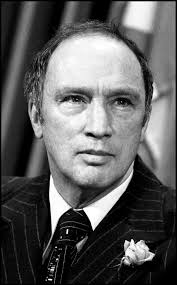
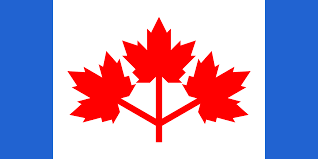
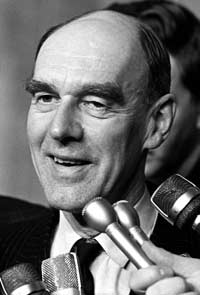
Above: Pierre Trudeau (Liberal, from Mount Royal, Quebec) and Robert Stanfield (Progressive Conservative, from Halifax, Nova Scotia), each their respective parties’ leaders in the 1968 Canadian Federal Elections.
The retirement of legendary Prime Minister Lester B. Pearson in early 1968 marked the end of one era in Canadian politics and the beginning of another. At least, that’s how things appeared in the wake of Liberal Party leadership elections to choose his successor. As the titanic Pearson prepared to step down, several of his closest advisers and cabinet members threw their hats into the ring to try and earn the right to carry the Liberal banner forward. Despite the best efforts of Paul Joseph, James Martin, Paul Hellyer, and Robert Winters however, one name; that of a handsome, eloquent, and fashionable bachelor stood out above the rest: Pierre Elliott Trudeau. 48 years old at the time, Trudeau’s victory left political pundits speechless and his fellow party members shocked. For the past several years, Trudeau served first as Pearson’s Parliamentary Secretary, then his Minister of Justice. Though Trudeau’s ascent to the upper echelons of the Liberal Party surprised many, the signs which portented his rise were easy to see to anyone paying close attention.
Many young people in Canada, especially young women, were increasingly influenced by 1960’s counterculture and identified with Trudeau, a relatively young, energetic nonconformist. Dazzled by his charm and good looks, a large fan base developed for the politician across the country. Some newspapers were so bold as to declare “With Pierre Elliott Trudeau, Canada may have found its own John Fitzgerald Kennedy.” The MP, representing Mount Royal, Quebec, would often be stopped on the street for his autograph or a picture with an enamored supporter. Though he projected a public face of bemused humility about his “rock star” image, Trudeau in fact carefully cultivated these qualities and used his astute political acumen to turn them into the cornerstone of a powerful public relations package. Trudeau had once sympathized with Marxists and had spent time as a member of the democratic socialist Cooperative Commonwealth Federation, though he had since walked back his views to fit more comfortably in the centre-left spectrum of Canadian politics which his current party represented. His liberal views on social issues, such as legalizing homosexuality and creating more flexible divorce laws while part of the Pearson Government attracted young people to Trudeau even more. Further, he was admired for his laid-back attitude and often high profile romantic relationships with celebrities, such as American singer and actress Barbara Streisand, whom he began seeing shortly after a concert of hers in Toronto and the leadership election in April of 1968. Mobbed at each of his public appearances by screaming girls and towing the beautiful Streisand on his arm, Trudeau was a political phenomenon. Given that his force of personality was like nothing Canada had ever seen before, the Liberals decided to let it comprise the majority of their campaign. Liberal campaign ads featured pictures of Trudeau inviting Canadians to "Come work with me", and encouraged them to "Vote for New Leadership for All of Canada". The substance of the campaign was based upon the creation of a "just society", with a proposed expansion of social programs.


Despite “Trudeaumania” sweeping the nation, the Liberals were experiencing unusually stiff resistance in the lead up to election day from their primary opposition, the Progressive Conservative Party. A crisis of confidence after three failed elections within the Tories led to the removal of former Prime Minister John Diefenbaker as party leader in 1967. The MP from Saskatchewan found himself replaced by a former Premier of Nova Scotia, Robert Lorne Stanfield. A self-proclaimed “Red Tory”, Stanfield’s political philosophy was centre-right, but advocated for communitarian, paternalistic economic policies to help the disadvantaged and the downtrodden. Spending his college years as a devoted student of John Maynard Keynes and calling himself an unabashed socialist (though he would later distance himself from that moniker), Stanfield’s answer to Trudeau’s slogan of “come work with me” was “for the Common Good”, a powerful, simple message that sold well to a Canadian public increasingly concerned with myriad issues as the 1960’s were drawing to a close. Only slightly older than Trudeau, and boasting a daunting resume of experience with human rights, Medicare, education, the arts, and even as an advocate for official bilingualism (a position which made him a controversial figure within his own party), Stanfield proved a formidable campaigner in his own right. Refusing to yield the issues to Trudeau and turn the campaign into a contest of personalities (in which Stanfield worried he would be smothered by the sheer magnitude of Trudeau’s charisma), Stanfield instead focused his attacks on Liberal complacency after years in power, and their leader’s perceived lack of experience. “While my opponent was bumming around, living it up and dating Hollywood actresses,” the Nova Scotian said in one speech. “I was in Halifax and then Ottawa working hard for my constituents and across the aisle to make Canada a stronger, more united nation. If you want real progress for our country, then Progressive Conservative is the right choice on election day.”
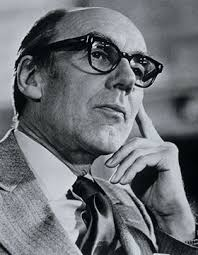
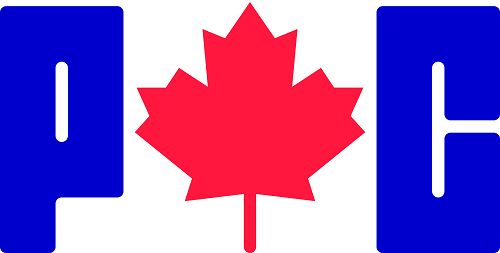
The Tories faced challenges of their own however, as they struggled to develop a united stance on the issue of rising Quebecois Nationalism. Trudeau, a federalist through and through was also bilingual and represented the Province in question in Parliament, Stanfield on the other hand spoke only English and represented Nova Scotia, slightly more removed from the issue. Trying to differentiate the Progressive Conservatives’ position from their Liberal opponents’, some members of Stanfield’s party began to embrace the idea of deux nations, meaning that their policies would be based on the notion that Canada was one country housing two distinct nations - French Canadians and Anglo-Canadians. Horrified at the implications this position might have in the long term, Stanfield and his fellow Tory leaders were quick to denounce the idea and backtrack, with Stanfield appearing in campaign ads vowing that the PC Party stood for “One country, One Canada.” Trudeau mocked the Conservatives viciously for what he called “their double-talk tango”, and had great success showcasing his own vision of Canada: whole, united, and prosperous. The Liberals however, came under attack shortly thereafter from their left flank, as the New Democratic Party (NDP) began to create ads calling for an even more rapid expansion of social policies. Seeing that both Trudeau and Stanfield represented more left-wing ideologies than either of their parties typically catered to, the NDP decided that the time was right to vigorously pursue their agenda, often at the expense of Trudeau’s liberals. A debate between Trudeau, Stanfield, and New Democratic Party leader Tommy Douglas was broadcast on the CBC on June 9th, 1968, and though it was a spirited, back and forth affair, a slight majority of Canadians handed Stanfield the victory, saying they favored his substance over Trudeau’s style and Douglas’ bombast. Election Day proper came at the end of the month, June 25th with results that once again surprised the nation:
264 seats in Parliament, 133 seats needed for a majority
Liberals - 118 seats (down from 128)
Progressive Conservatives - 104 seats (up from 94)
NDP - 24 seats (up from 22)
Ralliement creditiste - 18 (Up from 6)
Though he had failed to wrest control of Ottawa away from the Liberals, Stanfield had outperformed even his party’s wildest expectations. Tough campaigning, a keen ability to stay on task and on message, and a brilliantly organized ground game propelled the Tories to gains across the western strongholds and Atlantic Provinces, near Stanfield’s home. The NDP also benefited from their decision to get tough with Trudeau, possessing just enough seats to offer the disappointed Liberal leader a chance at a coalition government, should he agree to pursue a more progressive agenda. Eager to prove himself as more than “just a pretty face” as his rivals dismissed him as, Trudeau begrudgingly accepted Douglas’ offer and shortly thereafter formed a minority government, becoming Canada’s 15th Prime Minister. With rising Anglo-French tensions at home and various foreign policy crises developing abroad in the first months of Trudeau’s premiership, he soon began to feel the pressures of leading the Great White North falling on his shoulders. A little more than a year into his tenure, he and longtime girlfriend Barbara Streisand decided to take a much deserved vacation to her home in Los Angeles, where he hoped the weight of the world could leave his shoulders, even if only for a while.
…


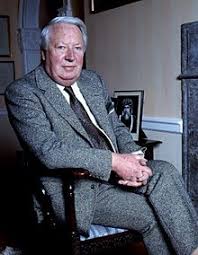
The summer of 1969 was, to say the very least, not the most fulfilling or joyful time in Prime Minister Harold Wilson’s career. With little more than a year left before a general election, a virtual referendum on Labour’s time in office and his accomplishments, events both at home and abroad seemed to conspire against him. Inflation, caused by his government’s continued defense and social spending despite promises to cut expenditures, was beginning to anger middle and working classes Britons. Meanwhile, in Rhodesia, in Randolph Churchill’s words, “ that little country across the world that means so much for the future of our world”, a second wave of conflict had erupted. Despite newly minted Prime Minister Winston Field’s promises of “peace and majority rule” as a Commonwealth dominion, he quickly was forced to go back on his word. Almost as soon as Field was instated as the Commonwealth of Rhodesia’s first Prime Minister, local white businessmen and elites began to advise the new leader against immediate majority rule. Decades of mistreatment and denial of rights to the black majority population planted deeply felt resentment and mistrust against their white countrymen, and in the Bush surrounding Salisbury, a new guerrilla movement rose to oppose Field’s government as “more imperialism masquerading as freedom”: the Zimbabwe African National Liberation Army (ZANLA). Led by the charismatic and ruthless Marxist-Leninist Robert Mugabe, ZANLA began attacking supply lines of the newly formed Royal Rhodesian Armed Forces, which included substantial numbers of British nationals serving as advisers to the new recruits. One particular incident of this new “Bush War”, on June 24th, 1969, saw ZANLA use heavy artillery guns given to them by their patrons in Beijing and Havana to kill nearly 150 Commonwealth soldiers, including 32 who were citizens of the United Kingdom. Horrified that their Prime Minister had failed to bring about a lasting, meaningful peace in sub-saharan Africa and that their young men were now dying to protect “Wilson’s Folly” as the press took to calling it, the British public released an emotional outcry against the Labour government. Wilson’s approval numbers plummeted to barely 27% and he struggled to rally his party or even put his head out in public. Though she maintained Royal political neutrality as ever, even Her Majesty, Queen Elizabeth II commented at her son, Prince Charles’ investiture on July 1st that the ceremony was taking place “in dark times indeed for Britannia and her Commonwealth allies”.
Sensing blood in the water, the Tories pounced on Labour’s misfortunes and prepared themselves for massive gains in the next year’s elections. This meant that the party’s 1969 leadership convention was, in their minds, practically an election of the nation’s next Prime Minister, and the event was treated with gravity befitting this fact. Then party leader Edward “Ted” Heath, who had served in that capacity since he replaced Sir Alexander Douglas-Home in 1965, believed himself to be the inevitable choice for the job and wanted to spend the convention debating the particulars of cabinet appointments and policy decisions for the beginning of his tenure the following year. Due to the renewed conflict in Rhodesia and other issues however, the political sands starting shifting beneath his feet, and Heath quickly found himself in a bit of a pickle. For starters, his Shadow Defense Secretary, Enoch Powell made international headlines the year prior with his now infamous “Rivers of Blood” speech, in which Powell pointedly criticized mass immigration to the UK, particularly from the other Commonwealth nations, and opposed the passage of the then-proposed anti-discrimination Race Relations Bill being mooted at the time. The speech was widely condemned both in the domestic press and internationally, with American President Kennedy speaking for much of the world when he called it “blatantly, virulently, and appallingly racist.” Heath was tempted to sack Powell from his position in response, but was surprised when subsequent polls found that between 67 and 82% of Britons asked agreed with Powell’s positions. The British people, it seemed, were tired to death of foreign affairs and trying to fix the world’s problems. “Leave that to the Americans,” they seemed to be saying. “Britain is for Britons and has problems of its own that need to be fixed!” Powell rallied this public support and wrote a private letter to Heath threatening “If you try and take me out of the cabinet, I’ll make a go for party leader, and good luck holding back the will of the people then!” Thoroughly whipped, Heath acquiesced and went into the leadership convention with Powell and his supporters firmly behind him.
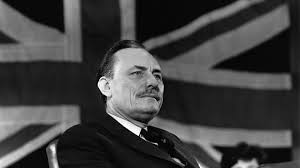

Heath’s remaining opposition came from the MP from Finchley, Margaret Thatcher. Unlike Heath and many Tories, who believed in or at least caved to the “post-war consensus” of government spending, the welfare state, and Keynesian economics, Thatcher espoused a philosophy more in line with American Buckley-ite paleoconservatism. She advocated slashing government spending and taxes, privatising state owned industries, deregulation (particularly of the financial sector), and reducing the power and influence of trade unions. Though personally unopposed to Enoch Powell, later saying that he “made a valid argument, if in sometimes regrettable terms”, Thatcher did not support Heath’s economic agenda and warned her fellow Britons that “a Heath government is hardly better than a continuation of the current Labour government. I have said that should Mr. Wilson remain in power, Britain will continue the march toward communism, I do not believe that a march toward socialism with Mr. Heath is a much more preferable alternative.” Ever a pragmatist at heart, Thatcher recognized that her relative obscurity would preclude her from a real shot at winning the leadership election, unless she attached herself to another, more well known figure and managed to win their support. There was, in Thatcher’s mind, one man who alone could win her the recognition she craved and in her own mind deserved: the son of the great British Bulldog himself: Randolph Churchill.
Churchill had himself changed over the last several years as well. Taking pride in his burgeoning political career and close relationship with his son and fellow MP Winston II, the 58 year old Churchill cleaned up his act, restored his health through exercise and kicked his problem with alcohol. Newly sober and full of the same fiery passion as his late father, Randolph first and foremost was eager to right the wrongs he saw rampant with the way the UK’s government was being run. Positioning himself as the “outsider reformist” of the Conservative Party, Churchill began the campaign leading up to the convention by releasing a series of scathing opinion pieces in major British papers, decrying first Prime Minister Wilson’s “abysmal handling” of the Rhodesia crisis and second, Ted Heath’s failure to condemn Enoch Powell’s “backward and barbaric” views on race. It was here that Churchill’s talents as a writer and journalist paid off for him. Unwilling to compromise with his party’s leadership in his quest for glory, Churchill also enjoyed the benefits of widespread public support, instant name recognition, and the infinite power of being able to say “I told you so”. Though Ted Heath was quick to condemn Wilson’s and Labour’s foreign policy now that it had come back to haunt them, Churchill had been a critic of the “Field Strategy” and its naivete from the beginning. To Churchill, who saw the entire conflict in Rhodesia as “the tragedy of decolonization gone wrong distilled down to its essence”, there were only two acceptable solutions to the problems being experienced there: either gradually withdraw, and limit British support to supplies and financial aid, while focusing efforts on repairing relations with the locals and improving their quality of life with gradual integration; or to double down and “truly deal with it” which meant going into a state of total war, and leveraging diplomatic influence to cut off the militias’ supplies from the Communist world. Given the practical reality of the British treasury and the United States having its own growing problems in Southeast Asia, Churchill saw the former as the more practical and therefore, correct option for the time. “We will not leave Rhodesia to chaos, bloodshed, and terror.” He said in a speech on the floor of the House of Commons, shortly before the convention. “Nor will we throw British lives away to protect a government which still denies to its people their basic, natural rights. If Prime Minister Field wants British soldiers to protect his precipitously placed palace, then British values he must espouse and project.” As the convention loomed, Churchill saw in Ted Heath weakness and a chance to push himself onto the national stage, his only problems were Heath himself and Margaret Thatcher.
Thatcher wanted the job for herself, that much was clear. Both he and she would need the other’s endorsement and support if either wanted to stand a chance of dethroning a sitting party leader, however. They could not afford to fight each other whilst simultaneously trying to take on Heath and the establishment. Thus, Churchill decided to tackle the competition head on and arranged a meeting with Thatcher only days before the leadership vote. Like his father before him, Randolph was known for his sharp wit and biting tongue, and spared nothing to the woman who would one day become the Iron Lady. He pointed out to Thatcher that not only was she 14 years younger than him and would likely have an opportunity to become party leader in the future by virtue of her youth alone, but that she was a woman, and that meant that others would expect twice as much of her to be taken seriously in what was obviously as male dominated a profession as politics. He frowned at the obvious inequality, but said “This is not the world as we would like it, but as it is.” So his counter offer to her request, that he stand aside and support her in exchange for a cabinet post, was exactly the opposite. In exchange for her vote, and her endorsement, Churchill would give Thatcher a spot in his cabinet and in the future, make it clear that he wished her to be his sole successor as party leader. Though they disagreed on just about every domestic policy imaginable, the two saw mostly eye to eye on foreign affairs and more importantly, shared an intense desire to stop Heath and Powell from coming into power, and so it was that when the Tories held a leadership election on July 17th, 1969, in one of the narrowest votes in party history, Randolph Churchill was named party leader over the incumbent Ted Heath.
Cheers of “Churchill! Churchill!” engulfed the hall as the final votes were tallied and Margaret Thatcher threw her arms around her new mentor in jubilation. Randolph felt tears well in his eyes as his fellow Tories called on him to say a few words. He could feel his father looking down on him, and hoped, deep in his heart, that he was proud. History would not relegate him to a mere footnote in its collective telling, Randolph dared to think. Even if he never lived up to the greatness of his progenitor, he would at least have a chance to leave his beloved Britain better off than he found it. As he pulled himself from Thatcher’s embrace and made his way to the podium to speak, he made a few mental decisions for after the general elections and the Tories’ all but inevitable victory. Ted Heath would be brought into the cabinet as Chancellor of the Exquecher, a position he’d shadowed for while in the opposition in the past. This would help bridge the gap in the party that Randolph and Margaret had blown open to steal the Premiership out from under him. Heath, desperate to affect public policy and save face would be in no position to refuse. As for Thatcher, his new pupil, Churchill decided that she belonged as Secretary of State for Commonwealth and Foreign Affairs, where he could groom her in his vision for a stronger British policy of promoting freedom around the world. Enoch Powell meanwhile, would not hold a position in the Conservative Party. His type of reactionary nonsense had no place in modern Britain, and needed to be purged. But before any of that, came Churchill’s speech. Unsure to the end whether he would win the leadership election or not, he prepared only a few brief remarks, beginning with some words from his endlessly quotable father:
“Thank you, thank you! This election, and the leadership of our beloved party comes at a critical time for our country and our Commonwealth. As I’m sure you’re all aware, we Britons are currently going through our own circle of Hell. But as my father was wont to say, ‘If you’re going through Hell, keep going!’ That is exactly what we will do...”


Next Time on Blue Skies in Camelot: The U.S. Senate and the Kennedys
Bullshit! Thatcher wrecked the economy, drove millions to unemployment, hollowed out whole swathes of the country, deregulated finance Turing London into a casino/hedge fund, allowed the remains of British industry to get bought out and destroyed as capital, gave away Noth Sea oil to rentowes, gave ludicrous tax cuts, forbid regional authorities from building more council homes contributing to the current shortage.Well that's a bit ominous. As tumultuous as parts of her tenure may have been, the monetarist economic reforms that Thatcher brought about were necessary to the rejuvenation of the British economy. I'm hoping that her tenure is long enough to put the British economy on the right track. Very much looking forwards to Afghanistan though.
There’s a reason when she died there were mass celebrations singing the wicked witch is dead!
Burton K Wheeler
Moderator
That was a post from 2019. Angrily making an off-topic response to a post that old is not good posting, please post better.Bullshit! Thatcher wrecked the economy, drove millions to unemployment, hollowed out whole swathes of the country, deregulated finance Turing London into a casino/hedge fund, allowed the remains of British industry to get bought out and destroyed as capital, gave away Noth Sea oil to rentowes, gave ludicrous tax cuts, forbid regional authorities from building more council homes contributing to the current shortage.
There’s a reason when she died there were mass celebrations singing the wicked witch is dead!
Deleted member 145219
Rest in Peace, President John F. Kennedy. Gone fifty nine years ago today. I don't know if you would have been a great as your were here in Blue Skies. But I don't doubt that America would have been better off had it not been for your death on this day.
Chapter 6: The End of the World: November 22nd, 1963
President Kennedy and the First Lady rose from bed early on the morning of Friday, November 22nd. Though reluctant to leave each other's’ embrace, both had busy days ahead of them, as each was painfully aware. The President gave a speech in a crowded square praising the city of Fort Worth for its burgeoning aviation industry, and a second at the Texas Hotel’s grand ballroom. The second of these was interrupted at the fifteen minute mark by the arrival of Mrs. Kennedy, who received a round of hearty applause. The President smiled warmly at her arrival. “My wonderful wife, ladies and gentlemen.”
As the speech was wrapping up, Roy Kellerman, the Secret Service agent in charge of the trip, was advised by Kenny O’Donnell that the Presidential limousine should keep its bubbletop on, as the weather reports predicted rain in Dallas during the procession through the city.

Press Secretary Mac Kilduff showed the First Couple a disturbing advertisement seen in The Dallas Morning News ironically headed “Welcome Mr. Kennedy to Dallas.” The ad morphed into a laundry list of complaints about the current administration, and blamed the President for many of the issues facing the world. Kennedy turned to the First Lady, gripping her hand tightly. “We’re heading into nut country today.”
At 11:38 AM, CST, the First Couple landed at Love Field in northwest Dallas aboard Air Force One. The cars for the Presidential motorcade had been lined up in a certain order earlier that morning. As he had been instructed, Agent Kellerman began to attach the bubble top to the back of the limousine. Through vexing winds and a steady drizzle of rain, reporters for local and national radio and television news arrived to catch the President as he and the First Lady made their way off of the plane. Still in the swing of their newfound closeness, Kennedy proved the gentleman, and was photographed holding an umbrella over Jackie as she made her way down to the car.
The First Couple would not be alone in the Presidential Limousine. Also in the car would be two secret service agents, one the driver, and the other in the front passenger seat; Texas Governor John Connally and his wife, Nellie would occupy the middle row of seats. President and First Lady Kennedy would take up the rear seats of the vehicle. As they filed into the automobile, the President cracked a joke about the rain, which nearly every weatherman in the country had failed to predict. The Texas Governor, no friend of the Kennedy administration despite his party affiliation, did not laugh, though his wife did. “Tough crowd.” The President whispered to Jackie, who hardly suppressed the chuckle which ensued. After the first couples posed for a picture in the car, Kellerman attached the bubble top.
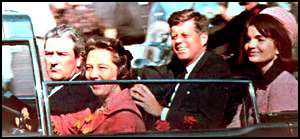
Earlier that day, at 7:23 AM, across the city, Lee Harvey Oswald showed up for work at the Texas Book Depository, carrying an ungodly long, cumbersome object wrapped in paper packaging. When asked by co worker Buell Wesley Frazier what was in the packaging, Oswald simply shrugged the question off. “Just some curtain rods.” He says, dismissively. “Did I tell you about the time I met Joe DiMaggio?”
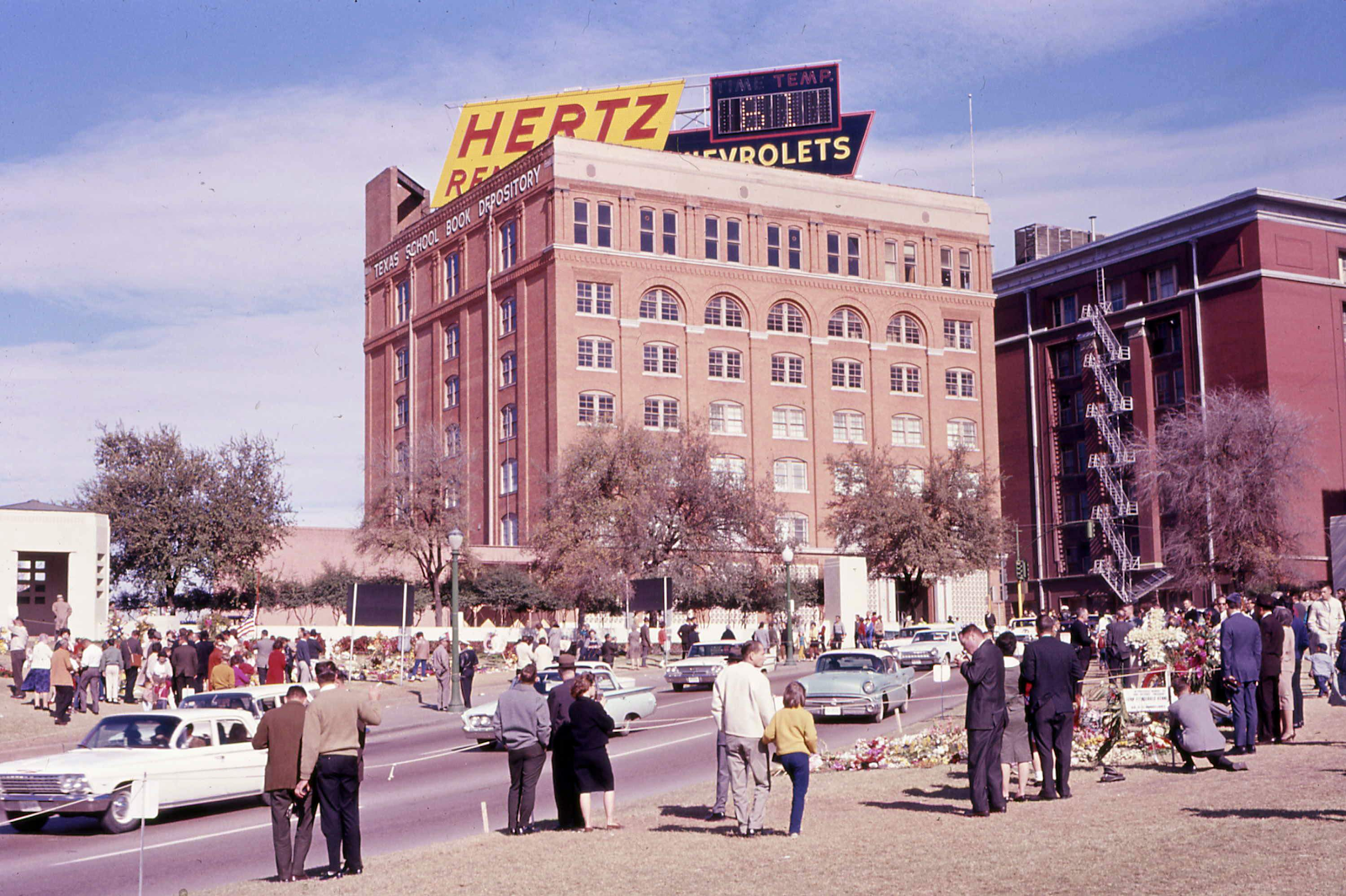
The motorcade departed Love Field at 11:45 AM, immediately setting a course for downtown Dallas. There, despite the less than ideal weather, nearly 150,000 people had gathered to see the President and First Lady as the limousine passed by. Kennedy, ever charming, did his best to remain animated and wave to the crowds through the confines of the car’s plastic bubble top. The onlookers and well wishers are a far cry from the critical, even threatening ad that the First Couple read earlier in the day.
At 12:29 PM, the Presidential motorcade entered Dealey Plaza after taking a 90 degree right turn from Main Street onto Houston Street. As they completed the turn, Nellie Connally turned to the President and grinned, gesturing to the thousands gathered beneath umbrellas and clutching their raincoats. “Mr. President,” she remarked. “You can’t say Dallas doesn’t love you.”

Having waited, rather impatiently, all day for the big moment, Oswald was ready. His “package of curtain rods” had been unfurled, revealing inside a 6.5x52mm Carcano Model 91/38 infantry rifle, with a telescopic sight. Italian made and ordered by Oswald through the mail under his alias of “Alek Hidell”, the rifle would be his tool for this job; the instrument of his vindication.

The former Marine sharpshooter rubbed his eyes and opened the sixth story window next to his hastily constructed sniper’s nest. “Fuck.” He whispered to himself. “Still raining. Oh well, shouldn’t make too much of a difference.”
The Presidential limousine came into view as it finished the turn from Main to Houston. Through his scope, Oswald could see the throng that had braved the weather, that had come out to see their “champion”. He scoffed and took a deep breath. They will never understand what I have come here to do. But perhaps their children may be able to. I shall be the Lenin of my age, or the Robespierre. I will be reviled in my own time, but history will forgive me, as it does all great men, all great revolutionaries.
The vehicle passed the Book Depository. The back of President Kennedy’s head began to line up with Oswald’s crosshairs. Oh Shit. The damn rain was starting to fog up the scope. Better do this quick, I’ll miss my chance. Oswald’s finger reached for the trigger, but his mind was as foggy as the sights on his weapon. He thought back to that trip to Mexico, meeting that baseball player, heard his words echo over and over again in his mind. "Do something that means something..." Oswald's arms trembled and his perfect shot grew shaky and uncertain.
On the ground, the President felt the squeeze of Mrs. Kennedy’s hand against his own. “What is it, Jackie?” He asked, his famous boyish grin spreading across his face.
“Come close.” She whispered, giddy. “I don’t want the bores in front to hear.”
The President leaned in toward his wife, intent on hearing what she had to say. Instead he heard what sounded at first like a motor bike backfiring in his other ear. Confused, he instinctively turned his eyes to the sky. A piece of the limousine’s bubble top flew inward, narrowly missing him and careening into the seat in front of him.
Before anyone could think, Mrs. Connally screamed, and a second shot was fired, its rapport suggesting the source to be the same as before. This time, the President felt a sharp, hot pain in his right shoulder. He knew in an instant that he’d been hit, even before the blood began to seep from the freshly made wound. The bullet seemed to have passed through him however, as in front of him, Governor Connally let out a grunt of pain just a second after the President felt his.
Not knowing what else to do, the President ducked, making himself as small as he could in the backseat of the limousine. By now, shrieks of terror were erupting from the crowds of people. Running away in a panic, many vacated the roadside, dropping their umbrellas to the grassy knoll as they sprinted to hopeful safety, away from the gunshots.
A clumsy third shot rang out in the plaza, but this one seemed to miss the Limousine completely, at least as far as the President could tell. Keeping his head low, he barked to the driver, his voice cold and hard as wrought iron. “Drive! To the nearest hospital as fast as you can!”
Following orders are something of a speciality for the secret service, and before long, the engine was gunned. The limousine gained speed and a moment later had vacated Dealey Plaza, making all possible speed for Parkland Hospital.
Kennedy, feeling intense pain, but also relief, wasted no time in sitting up and looking in his wife’s direction. “Jackie!” he cried, praying that she was unharmed.
Though sitting perfectly still and silent, the First Lady was unharmed. At first unable to speak, she threw her arms around her husband. “Oh, Jack!” She cried, tears beginning to form. “Are you alright? Did he get you?”
The President gently removed his hand from Jackie’s, now covered in sweat, and held down the wound on his shoulder. “I’m fine. I told you, absolute nut country.”
The First Lady, seeing the exit wound, removed her hat and held it over her husband’s hand. “Jack, I… I Love you so much.” She pulled him close and kissed him, harder and truer than she had since their wedding day. Still shaking, she reached out to Mrs. Connally. “Nellie, John! Are you alright?”
Nellie Connally did not respond right away, she was still reeling from what had happened. “Nellie!” The President called to her this time. “What’s going on up there?” He reached forward to try and get a better look and was appalled with what greeted him: a massive hole in the center of the Texas Governor’s chest. Kennedy took a deep breath and steeled himself. The ride to Parkland were the longest seven minutes of his life.

Back in Dealey Plaza, local police were swarming like hornets around a nest. Oswald, realizing that in his haze he had missed his date with destiny, wasted no time in getting the hell out of there. Cursing under his breath every step of the way, the would be assassin hid his Carcano rifle behind some boxes in the northwest corner of the Depository and swiftly made his way downstairs to the second floor of the building. As he reached the second floor lunchroom, Oswald walked with purpose but with a face completely void of emotion. This would serve him well.
“Put your hands in the air!” A motorcycle cop - Oswald could tell by the helmet - pointed a .38 revolver at him and held it steady. “Who the hell is this one?” The cop, Baker, according to his nametag, asked Roy Truly, the superintendent of the building, Oswald’s boss.
“He’s Harvey!” Truly replied. “Let him go, he’s one of mine!”
No more words were needed. The cop lowered his gun and the pair continued their ascent up to the sixth floor, where witnesses reported hearing gunshots coming from. Oswald saw his chance and took it, walking out the front door of the Depository at 12:33 PM.
Following a convoluted path back to the rooming house where he stayed during the week, the shooter gathered what cash he had on hand, the .38 Smith and Wesson revolver he’d ordered along with the rifle through the mail, and a suitcase full of spare clothing. Charging out into the street, he flagged down an approaching truck, a 1950 Ford F-6 and whipped out the pistol at the driver. “It’s not worth your life pal, is it?”
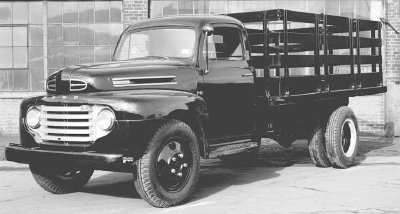
The driver agreed and immediately left the truck, darting down the road as soon as he saw the gun. Once behind the driver’s seat, Oswald got it into gear, reversed, and sped as quickly as he could toward the city limits. Before long, the police would be closing Dallas, and Oswald had no intention of being caught. Not until I do something with meaning. The shooter’s eyes were wide, and full of rage. Not until I go down in history.
…
At 1:13 PM CST, acting White House Press Secretary Malcolm Kilduff entered a nurses’ classroom at Parkland Hospital filled with press reporters. His hair tousled and soaked with sweat, Kilduff gave the first official announcement on what had occurred. “President John F. Kennedy was the intended target of an assassination attempt this afternoon in Dallas. The President was shot in the shoulder. He is undergoing surgery at the moment in what the doctors are calling severe, but not critical condition. He is expected to not only survive this attempt on his life, but to make a full recovery. Governor John Connally was not so lucky. The bullet which struck President Kennedy’s shoulder passed through the President’s arm and pierced Governor Connally’s heart, rendering him dead almost instantly. I have no further details regarding the assassination of the Governor, but will pass on information as soon as it is made available.”

Rest in Peace: Governor John Bowden Connally Jr.
February 27th, 1917 - November 22nd, 1963
marktaha
Banned
Powell also fought Nazis!Sorry but Yes Heath would never acquiesce on keeping Powell around, he hated the man and immediately sacked him, Heath fought Nazis, there’s no way he keeps Enoch Powell on. Period!
Oh yeah I didn’t realise that today is the anniversary until just right now when I read this. Rest in peace Mr. President.Rest in Peace, President John F. Kennedy. Gone fifty nine years ago today. I don't know if you would have been a great as your were here in Blue Skies. But I don't doubt that America would have been better off had it not been for your death on this day.
Rest in peace President John F. Kennedy (29 May 1917 - 22 November 1963)Oh yeah I didn’t realise that today is the anniversary until just right now when I read this. Rest in peace Mr. President.
As an intelligence and adminstrative officer who famously regretted never being in actual combat, Heath was an artilleryman and fought in France and Germany. I suspect Heath would just add "also a REMF" to his list of reasons to dislike the man.Powell also fought Nazis!
Honestly, based on my limited knowledge of Enoch Powell, he seems to have been just a batshit crazy classics nerd who thought the ancient Greek polis system was the ideal political system.
Not exactly somebody I'd vote for but not exactly a fascist either.
Not exactly somebody I'd vote for but not exactly a fascist either.
He was a pretty bad racist at just the moment it became unacceptable to be that openly though.Honestly, based on my limited knowledge of Enoch Powell, he seems to have been just a batshit crazy classics nerd who thought the ancient Greek polis system was the ideal political system.
Not exactly somebody I'd vote for but not exactly a fascist either.
Oh yeah the guy was fucking crazy, but he also said this back in the '50s about the Hola massacre:He was a pretty bad racist at just the moment it became unacceptable to be that openly though.
now that might've been politically motivated (iirc he was in opposition at the time), but he seems to me to have been a megafan of ancient Greece and its political system, where every group has its own tribal lands and does their own thing as a nationalistic isolationist state.Nor can we ourselves pick and choose where and in what parts of the world we shall use this or that kind of standard. We cannot say, "We will have African standards in Africa, Asian standards in Asia and perhaps British standards here at home". We have not that choice to make. We must be consistent with ourselves everywhere. All Government, all influence of man upon man, rests upon opinion. What we can do in Africa, where we still govern and where we no longer govern, depends upon the opinion which is entertained of the way in which this country acts and the way in which Englishmen act. We cannot, we dare not, in Africa of all places, fall below our own highest standards in the acceptance of responsibility.
Still completely disconnected from modern reality, but the thought processes behind his views were clearly more complicated than the popular image of him.
Share: